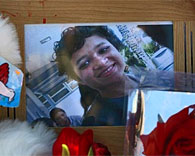Hundreds have marched on Saturday in tribute to a teenager who was shot to death in his Southern California junior high school's computer lab. More than 20 other students were in the room at the time.

Lawrence King will be remembered on www.GayAmericanHeroes.com, a project which honours those who have given their lives for
According to media reports, his alleged assailant, Brandon McInerney, 14, has been charged with attempted murder which has been classified as a hate crime. He was being held in Juvenile Hall in lieu of US$770,000 bail and will be tried as an adult.
If convicted as an adult, McInerney could face 25 years to life, plus an additional maximum of 25 years for firearm use and one to three years if the shooting is found to be a hate crime.
The police have declined to decline the evidence behind the hate crime charge but several classmates said King, who had come out as gay, sometimes wore makeup, high heels and other feminine attire.
One classmate told the Los Angeles Times that eighth-grader's appearance had "freak(ed) the guys out."
King's death has prompted vigils, a student-organised march and calls to revive anti-hate crime legislation.
On Friday, the National Gay and Lesbian Task Force released a statement denouncing anti-gay student violence. It read in part, "Our hearts go out to Lawrence's family Ś and to all young lesbian, gay, bisexual and transgender kids who are Ś right now, right this minute Ś being bullied and beaten in school while adults look the other way."
Several groups including the Gay-Straight Alliance (GSA) Network also issued a press statement last week calling for more education and stronger protection against bullies in schools.
"With young people coming out at younger ages, out schools - especially our junior high and middle schools - need to be proactive about teaching respect for diversity based on sexual orientation and gender identity," said Carolyn Laub, executive director of the GSA Network, in the statement.
"The tragic death of Lawrence King is a wake-up call for our schools to better protect students from harassment at school. As a society, we can prevent this kind of violence from happening."
Under the California Student Safety and Violence Prevention Act enacted in 2000, students are protected from harassment and discrimination based on sexual orientation and gender identity and expression in schools. The law was further strengthened through the passage of AB 394 (The Safe Place to Learn Act) and SB 777 (The CA Student Civil Rights Act), which went into effect on January 1, 2008. The Safe Place to Learn Act guides school districts in adopting and publicising anti-harassment policies and complaint procedures, updating publications on school safety and discrimination, keeping records of complaints and how they were resolved, and providing training for teachers on how to combat bias in the classroom.
